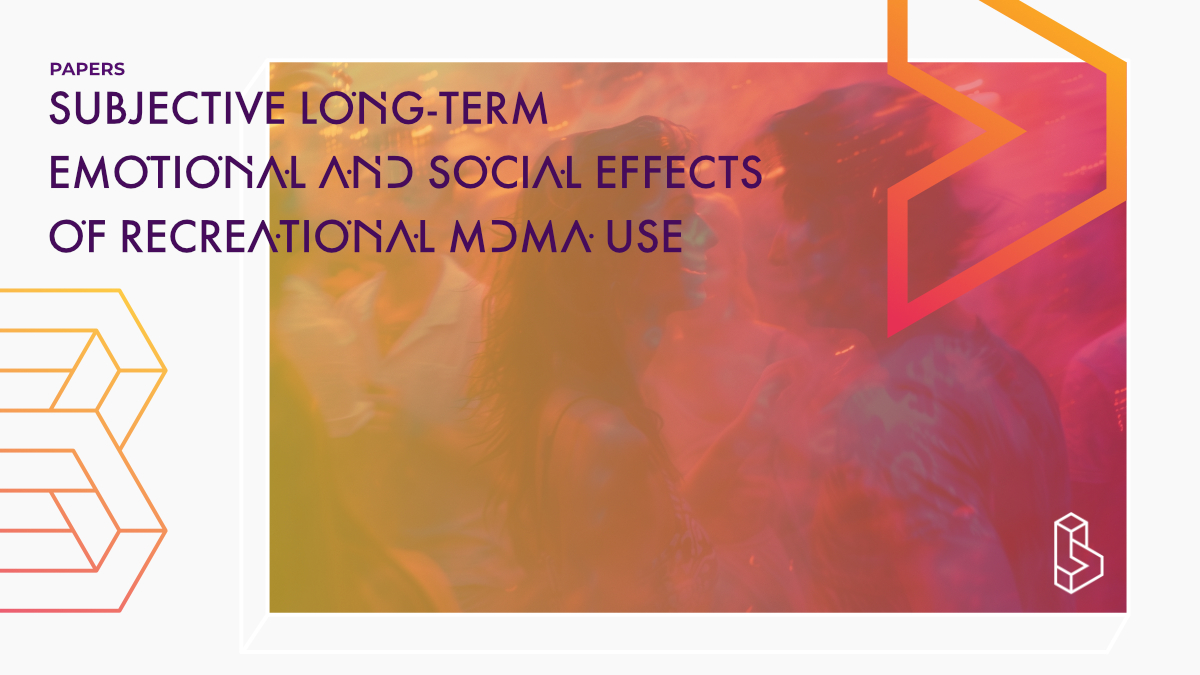This survey study (n=766) explores the consumption habits and perceived long-term social-emotional effects of MDMA use among individuals aged 18–61, primarily from Western countries. Utilizing a K-medoids clustering algorithm, researchers identified three consumption setting types—party settings with friends (n=388), private home settings (n=132), and mixed settings (n=246)—and three intention types—euphoria and energy (n=302), self-insight (n=219), and mixed intentions (n=245). The study found that individuals in the self-insight and mixed intentions clusters reported more long-term socio-emotional benefits compared to those seeking solely euphoria and energy, with no significant differences observed between the setting clusters.
Abstract of Subjective long-term emotional and social effects of recreational MDMA use
“MDMA is a recreational drug commonly used to enhance euphoria, but it is also used in non-party settings with self-insight or social connection intentions. Yet, little is known about whether distinct consumer groups are formed based on consumption setting and intention. We aimed to characterize different types of recreational MDMA users based on consumption setting and intentions, and to examine their differences in perceptions of long-term social-emotional effects of MDMA use. We analyzed self-reports of 766 individuals (ages 18–61, mostly from Western countries), reporting on their MDMA consumption habits and perceived effects. We used a K-medoids clustering algorithm to identify distinct types of consumption settings and intentions. We identified three setting types – party settings with friends (N = 388), private home settings (N = 132), mixed settings (N = 246) – and three intention types – euphoria and energy (N = 302), self-insight (N = 219), mixed intentions (N = 245). Members of the self-insight and mixed intentions clusters reported considerably more long-term socio-emotional benefits than members of the euphoria and energy cluster. No differences were observed between the setting clusters. In this particular sample, more long-term benefits than harms were reported. Our findings suggest that the long-term social-emotional benefits of MDMA are associated with whether users seek self-insight or have mixed intentions.”
Authors: Timon Elmer, Tanya K. Vannoy, Erich Studerus & Sonja Lyubomirsky
Summary of Subjective long-term emotional and social effects of recreational MDMA use
MDMA is a psychoactive drug that has gained increasing popularity as a recreational substance. Its short-term effects include feelings of euphoria, reduced fear and negativity, and increased sociability.
To date, less is known about the long-term social and emotional benefits of recreational MDMA use. The present study aims to address this gap by investigating patterns of recreational MDMA consumption and their potential long-term benefits and harms in terms of emotional experiences and feelings of social connection.
The set and setting hypothesis suggests that the subjective effects of psychoactive substances, such as MDMA, are influenced by both individual and environmental factors. This hypothesis is supported by limited research on the long-term effects of MDMA use.
Find this paper
https://doi.org/10.1038/s41598-024-51355-6
Open Access | Google Scholar | Backup | 🕊
Cite this paper (APA)
Elmer, T., Vannoy, T. K., Studerus, E., & Lyubomirsky, S. (2024). Subjective long-term emotional and social effects of recreational MDMA use: the role of setting and intentions. Scientific Reports, 14(1), 1-13.

